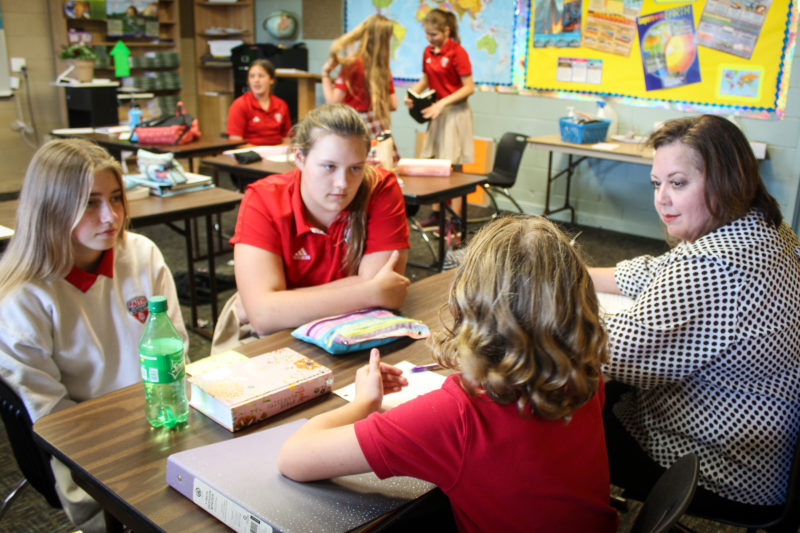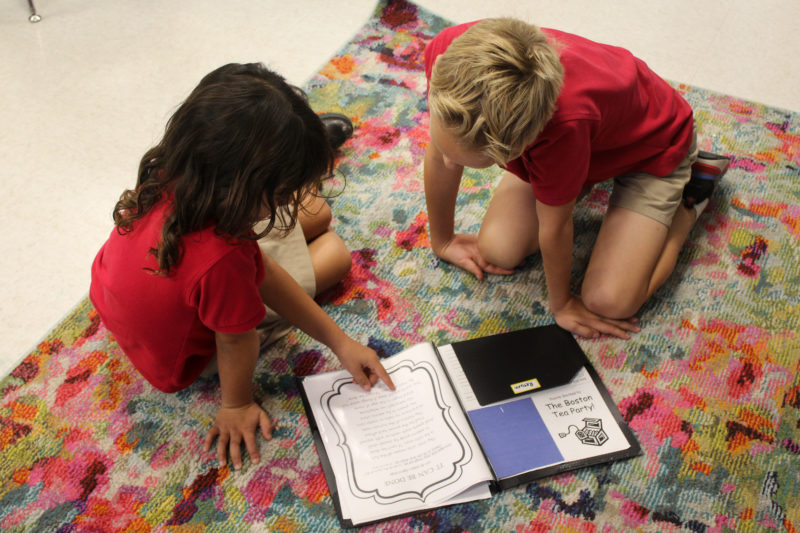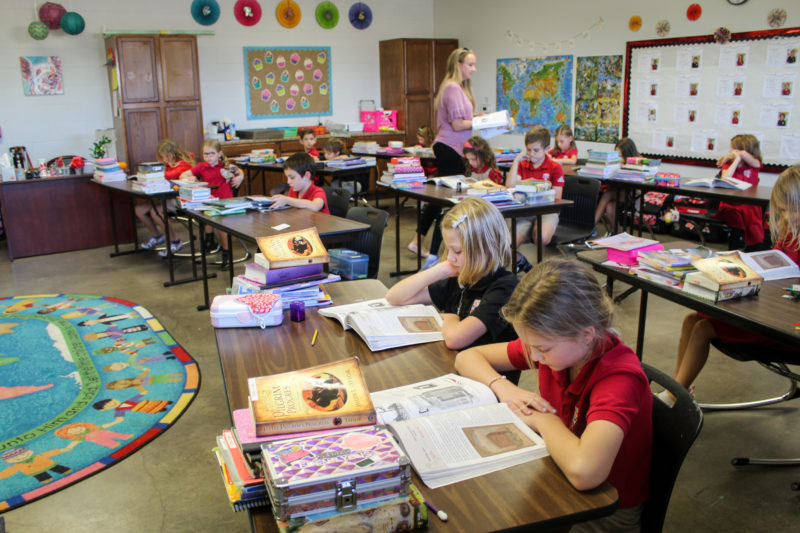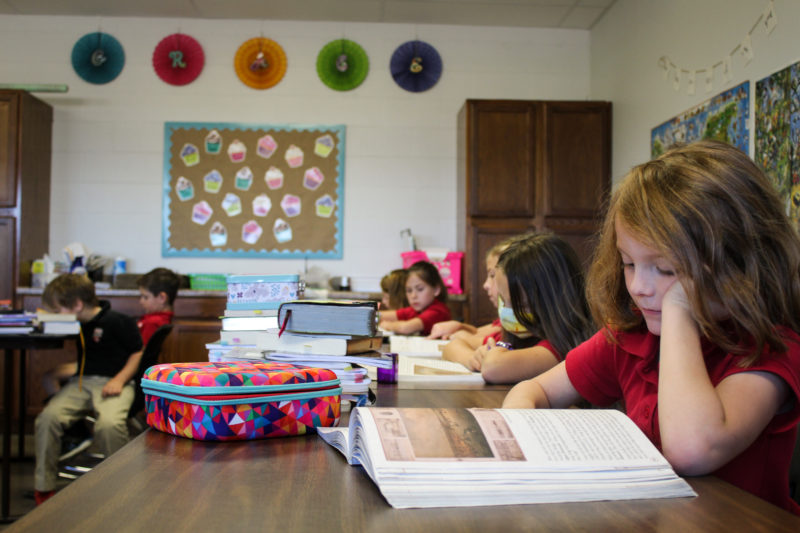Central Texas Christian School Enrollment Surges Amid Curriculum, COVID-19 Concerns
By Gabriella Ybarra
Reporting Texas

Faith Academy of Marble Falls seventh-grade students (from left to right) AvaLynn Eppler, Megan Burrows and Jacey Hill sit with Head of School Amy Cozby in Bible class on Nov. 16, 2021, in Marble Falls. The Christian school, which serves 321 students, saw a 51% increase in its enrollment since the beginning of the pandemic. The increase is part of a nationwide trend in favor of Christian schooling fueled by a dissatisfaction with COVID-19 policies, critical race theory and the inclusion of sexually descriptive books. Gabriella Ybarra/Reporting Texas
Enrollment at conservative Christian schools in Central Texas is booming.
School administrators attribute the increase to parental anxieties surrounding COVID-19 policies, discussion of systemic racism in the classroom and the inclusion of curriculum with sexual content.
“I think people just say, ‘OK, well, if you’re just going to force us to live this way, and you’re going to destroy our children, we’re just pulling out and going to find an alternative,’ ” said Scott Maczuga, head of school at Warriors Christian Academy in Leander. Maczuga said 80 students have enrolled since the school opened in fall 2020.
The increase is part of a nationwide trend. The Association of Christian Schools International, one of the country’s largest networks of evangelical schools, grew its K-12 enrollment by 12% between 2019 and 2021, according to a report by the New York Times.
Meanwhile, enrollment in Texas public schools decreased for the first time during the 2020-21 school year — in the midst of the COVID-19 pandemic — by 2.2%, about 122,000 students, according to numbers from the Texas Education Agency.
The Austin Independent School District, which has been losing students for half a decade, went from about 81,000 students in the 2019-20 school year to about 75,000 in 2020-21, according to numbers from the district.
While many public schools shifted online during the pandemic, many private schools maintained in-person classes, and many of those eschewed mask requirements for staff and students.
Parents grew frustrated with the quality of their children’s education in public schools during the height of the pandemic and were worried they were falling behind, said Amy Cozby, head of school at Faith Academy of Marble Falls, which stayed in-person since the start of the pandemic.

Faith Academy of Marble Falls second-graders, Olivia Gonzalez, left, and Hank Henson read on the classroom floor on Nov. 16, 2021, in Marble Falls. Gabriella Ybarra/Reporting Texas
Faith Academy, which serves 321 students, has seen a 51% increase since fall 2019. Round Rock Christian Academy, which serves 618 students, has seen a 20% increase in enrollment. Hill Country Christian School in Cedar Park, which serves 599 students, has seen a 15% increase. (All numbers provided by the schools.)
“The biggest concern that most of our parents have mentioned is the fact that (their kids) didn’t do anything during COVID, that learning did not go on, that kids were kind of left to fend for themselves,” Cozby said.
Austin school district spokesperson Eduardo Villa said teachers and staff have worked to keep students motivated and engaged during the past 18 months.
Villa said AISD has prioritized the health and safety of its students during the pandemic, emphasizing that the school district has the lowest COVID case rate per 1,000 students in Central Texas. “During the pandemic, we had a lot of learning going on,” Villa said.
Matt Fogle, a Hill Country Christian School parent who pulled his kids out of the Round Rock Independent School District, said that during the pandemic, he found himself teaching his kids at home after realizing they “didn’t know basic things.”
“They had never done a multiplication table; they didn’t know how to do long division — and that was in seventh grade,” Fogle said. “That’s a travesty; that shouldn’t be my job.”
Jenny Caputo, chief of public affairs and communication for RRISD, said that although it’s disappointing to hear bad experiences from parents, RRISD is equipped to work with families to address their concerns.
“The pandemic has been difficult for students and educators, and this year has been particularly challenging as we try to make up lost ground,” Caputo said. “If parents are dissatisfied, we would hope they would work with their teacher and/or principal to seek a solution.”
Concerns over school curriculum, especially discussion of systemic racism, also played a role in the increase in private Christian school enrollment, Cozby said.

Faith Academy of Marble Falls students read their textbooks in Amanda May’s third-grade class on Nov. 16, 2021, in Marble Falls. Gabriella Ybarra/Reporting Texas
Critical race theory, a college-level academic framework that explains how policies and laws in the U.S. uphold systemic racism, has dominated school board meetings and education debates around the state. While critical race theory is not taught in public schools in Texas, it has become a catch-all conservative buzzword for almost any discussion of race and diversity in classrooms.
In September, Gov. Greg Abbott signed a bill into law that putatively bans the teaching of critical race theory in schools. Critics say the bill, which doesn’t mention critical race theory, effectively bans an honest discussion of racial history in the U.S.
“This is really about the teaching of anything related to race and racism,” said Kevin Cokley, UT-Austin department chair of educational psychology and African and African Diaspora studies professor.
Cokley says there is a discomfort, particularly among some white parents, to engage in candid discussions about racism.
“We do (students) a disservice when they are not taught critically the true history of race, race relations and racism in this country,” Cokley said.
Hill Country Christian School parent Matt Kouri says he was once a proud advocate for public school education, but several factors led to him taking two of his three kids out of Round Rock ISD.
“We had minor concerns over the years that some of the curriculum was starting to slip into sort of the more social advocacy realm,” Kouri said. “But it completely hit a new crescendo last fall.”
Kouri was upset with the inclusion of “Stamped: Racism, Antiracism, and You” by Jason Reynolds and Ibram X. Kendi in his son’s eighth-grade language arts class.
According to the publisher’s website, the book is meant to “shine a light on the many insidious forms of racist ideas and on ways readers can identify and stamp out racist thoughts in their daily lives.”
“It really came down to a sense that Round Rock had started to allow a whole lot more of teaching kids what to believe as opposed to teaching them how to think,” Kouri said.
He filed a complaint about the book with the school district in October 2020. After a petition in support of the book garnered over 3,600 signatures, the district decided not to remove it from a list of approved books.
“It was reviewed, it did go through the formal process, and it was found to be a legitimate instructional resource,” Caputo said.

Faith Academy of Marble Falls third-grader Kate Reinert reads her textbook on Nov. 16, 2021, in Marble Falls. Gabriella Ybarra/Reporting Texas
Jeff Marx, head of school at Hill Country Christian School, says parents are not necessarily opposed to their students being taught critical race theory but are “appalled that it, ironically, is taught uncritically, without any discussion of potential flaws.”
Marx said Hill Country Christian School offers a leadership class that includes discussions of race and requires students to “consider all culture issues fairly from many perspectives” and “discuss disagreements respectfully and love all people as Jesus did.”
Incidents involving objections to school books have broken out in other Central Texas school districts. In Leander ISD, several books were pulled from high school book club reading lists after parents criticized them for sexually explicit content.
These concerns led to state Rep. Matt Krause, R-Fort Worth, to launch an investigation into books in public schools that deal with issues of race, gender identity and sexuality.
Caputo says she understands that parents have the right to make the best decision for their children’s education — including if that means placing them into private schools.
“We strive to make sure that if you live in Round Rock ISD, that you will feel that a Round Rock ISD campus is absolutely the best place for your child where they’ll receive the best education,” Caputo said, “but we understand that it’s never going to be 100%.”
Kouri says his children are doing well at Hill Country Christian, and he is happy with his decision to move them to a school where the curriculum is rooted on a biblical worldview.
“We love the faith base of Hill Country. It’s been very refreshing,” Kouri said. “It’s been good for our kids’ souls.”